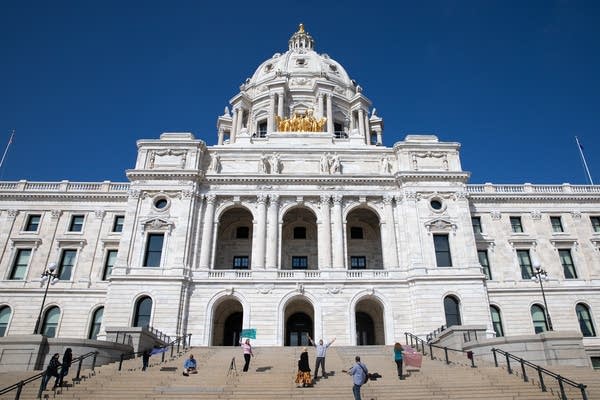COVID-19 brings red ink back to state budget

Go Deeper.
Create an account or log in to save stories.
Like this?
Thanks for liking this story! We have added it to a list of your favorite stories.
Minnesota faces a $2.426 billion projected budget deficit that stems from coronavirus fallout, a grim outlook that led Gov. Tim Walz to order his finance team to “put every scenario on the table” to fix.
The Department of Minnesota Management and Budget released the figure Tuesday in an unusual mid-year update to its economic forecasting. It marks a sudden turn from two months ago, when officials were predicting a $1.5 billion surplus through July of next year.
Anticipated tax collections have plummeted by an estimated $3.6 billion with many people out of work and commerce severely disrupted by COVID-19 mitigation efforts. Spending is also up by $391 million as state leaders worked to urgently respond to public health and economic needs and as more residents tapped into subsidized health care programs.
“Given the uncertainty about the path of pandemic, the economic outlook will remain volatile for some time,” the state budget agency warned.
Turn Up Your Support
MPR News helps you turn down the noise and build shared understanding. Turn up your support for this public resource and keep trusted journalism accessible to all.
The report suggested the economic strain will drag on for several more months, perhaps into next year. Even then, it will take time for tax revenues to bounce back.
At a news conference, Walz didn’t outline what he would propose to repair the damage, although he didn’t rule out spending reductions or pay cuts for employees.
“Certainly at this point in time we have to leave everything on the table,” he said.
Republican House Minority Leader Kurt Daudt said cuts are necessary. “Government must share in the sacrifice," Daudt said in a written statement.
The new budget projection gives Walz power to tap into Minnesota’s reserve fund that has $2.359 billion in it if quick action is necessary. But he said given the economic uncertainty, it would be a mistake to “just dump the budget reserves in and you're even today. Because tomorrow if we go back in, it's not there."
MMB Commissioner Myron Frans said Minnesota is in a better starting position because of past efforts to build up that reserve.
“There's a reason we call that a rainy day fund. It's for a rainy day,” he said. “And while today is a rainy day, unfortunately, now is the time to use some of our $2.3 billion rainy day fund to help weather the severe economic downturn.”
Minnesota also has almost $2 billion coming from the federal government, although that is restricted to direct coronavirus response activities. The state has already spent hundreds of millions of dollars that could be swapped out with the federal funds.
Democratic House Speaker Melissa Hortman, DFL-Brooklyn Park, said additional relief for housing problems caused by COVID-19, demand for telemedicine and aid for distance learning activities could still pass this year.
“The federal assistance allows us to make these needed investments, while our state's savings will cover our expected dip in revenue,” Hortman said.
Groups representing county governments were quick out of the gate calling for the state to send aid payments on time. Walz said he views them as partners in the COVID-19 fight. State labor unions pointed out that their workers are on the front lines, in health labs or fulfilling unemployment claims, and shouldn’t bear the brunt of any cuts.
Walz said addressing the budget problems might require a special legislative session because the Legislature’s regular session must adjourn by May 18.
The Legislature doesn’t have to fix the problem before it goes home for the year, but lawmakers could make some initial moves. In a small cost-saving gesture Tuesday, the Senate pulled back on merit raises for its employees that were supposed to happen in July.
“We all know we’re in a serious spot. It’s not something I want to do, but it is something I think we need to do,” said Senate Majority Leader Paul Gazelka, R-East Gull Lake, of the expected $410,000 in savings.
He predicted the House would take a similar step and executive branch employees could also see a freeze in pay. Contracts for unionized state workers are awaiting legislative ratification, and there would have to be additional negotiations to hold back raises for thousands of employees.
There have also been initial discussions about barring travel.
Walz, his chief of staff and two dozen agency commissioners already took 10 percent pay cuts to prune expenses.
Lawmaker salaries are set by a state commission, which isn’t set to make another decision until next year. Gazelka said other expenses, for lawmaker lodging and meals, are being held flat.
Dear reader,
Your voice matters. And we want to hear it.
Will you help shape the future of Minnesota Public Radio by taking our short Listener Survey?
It only takes a few minutes, and your input helps us serve you better—whether it’s news, culture, or the conversations that matter most to Minnesotans.



